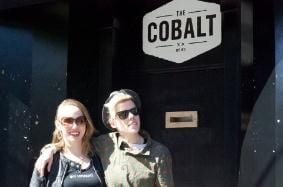Selina Shefrin was leaving The Cobalt after Man Up Amateur Hour on Feb 7 when a man approached her and struck up a conversation.
“The end result was I was raped upstairs in a Cobalt hotel room,” she says.
The response from her community was immediate, she says. When she told Man Up organizer Paige Frewer and long-time community organizer Pussy Liquor what had happened, the two decided to do something about it.
“They automatically did it, even though I was afraid to come forward,” says Shefrin, who is also known as drag king Owen. “They were the ones who said, ‘We want to be there for this person, and we’re going to be there for this person.’”
Inspired by community responses to violence such as Take Back the Night and Seattle’s Home Alive initiative, Liquor launched the Buddy System, a program of volunteers at Man Up events who decide to stay sober and look out for their fellow partygoers. Volunteers provide bottled water, run interference if someone is receiving unwanted attention and generally serve as go-to support people should any problems arise.
“It’s like an outreach position,” Liquor says. “That’s how I like to think about it.”
The Buddy System debuted at the Feb 27 edition of Man Up. The organizers put out a call for volunteers before the show, encouraging those who wanted to participate to sign up upon their arrival. Buddies are equipped with bus tickets, safer-sex products, safer injection kits, and glow sticks to wear as bracelets so they’re easy to spot. Liquor also carries basics such as lighters and rolling papers. She says it’s a way to make the program as inclusive and non-judgmental as possible.
“You don’t have to be someone who needs to access the Buddy System for specific Buddy System help,” she says. “It’s an opening for people to come and talk to us, so it creates a community presence even just by giving out papers and lighting someone’s cigarette.”
Liquor says the system has so far been well received. She’ll run it for the third time this Saturday, April 27.
“It’ll be kind of an ongoing process,” she says, “and we’ll hopefully see some growth in the number of people who access the Buddy System and the variety of services and answers they seek, as it builds a stronger presence in the community and people feel more comfortable using it.”
Liquor says the emphasis on volunteers remaining sober has generated discussion about the large number of people in the queer community who are in recovery. Frewer says she now gives a shout-out at least once a show to all those staying sober, whether they’re program volunteers or not.
“Just making it explicitly stated that everyone is here to enjoy the show and everyone is welcome, no matter how you’re doing it.”
She and Liquor say they chose a harm-reduction approach for the Buddy System because they have seen it in action and found it effective. Liquor says her own experience as a former sex worker and as someone who has dealt with substance abuse issues informed her decision to pitch the idea, and Frewer jumped on it.
“I have worked and volunteered on the Downtown Eastside and have been sufficiently exposed to the harm-reduction model to have adopted it in my own personal ideology,” Frewer says. “I was on board with the idea right away.”
While the primary goal is to keep partygoers safe, they’re committed to building awareness both within community spaces and without.
“The Buddy System arose as, simultaneously, an acknowledgment of the fact that we are not confined to our community and the guests of the event, as well as a statement that we need to do something about that and recognize that no matter where we are — East Van, Main Street, north Main — understand that there are potential predators all over the place.”
Of course, holding queer events in the Davie Village does not preclude predators, they hasten to add.
“The fundamental, bottom-line purpose of the Buddy System is keeping people safe, and it’s primarily a physical safety, but it’s also a psychological safety,” Frewer says. “It’s acceptance for whatever you’re up to.”
Shefrin went back to The Cobalt at the end of February to perform in the Man Up show. It was the Buddy System’s first night running.
That night, she says, she heard attendees questioning the need for the system. She decided to come forward about what happened to her so that others can better understand the need for community outreach programs like this.
“We’re already, in general, a community that struggles,” she says. “We’re all different mixes of people — gay, straight, bi, trans, everything in between — and we’re all struggling to be part of it.”

 Why you can trust Xtra
Why you can trust Xtra


